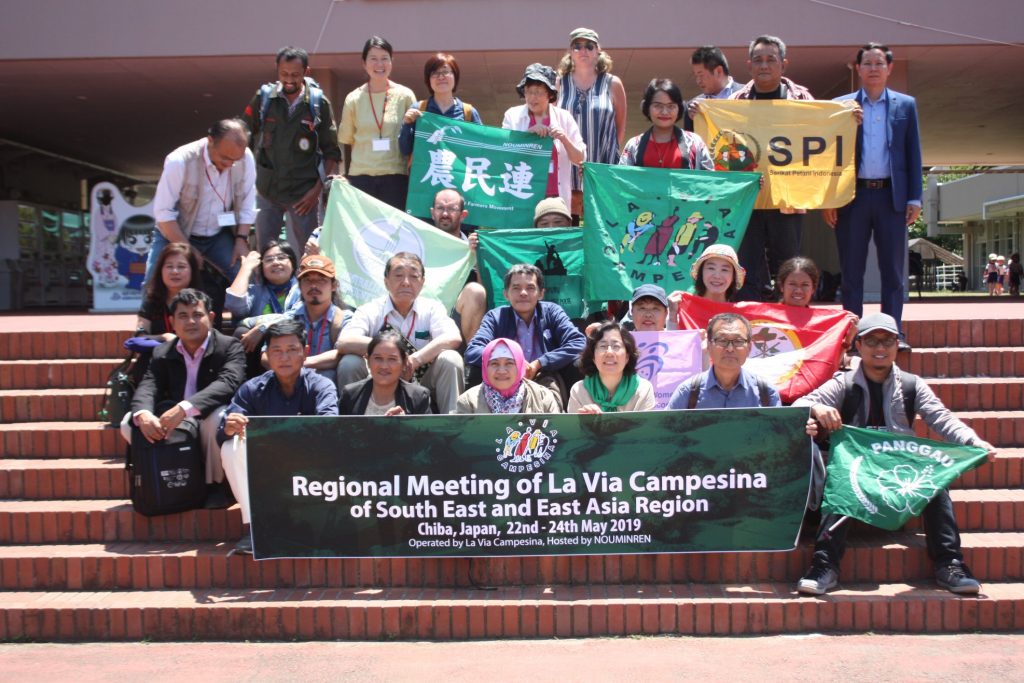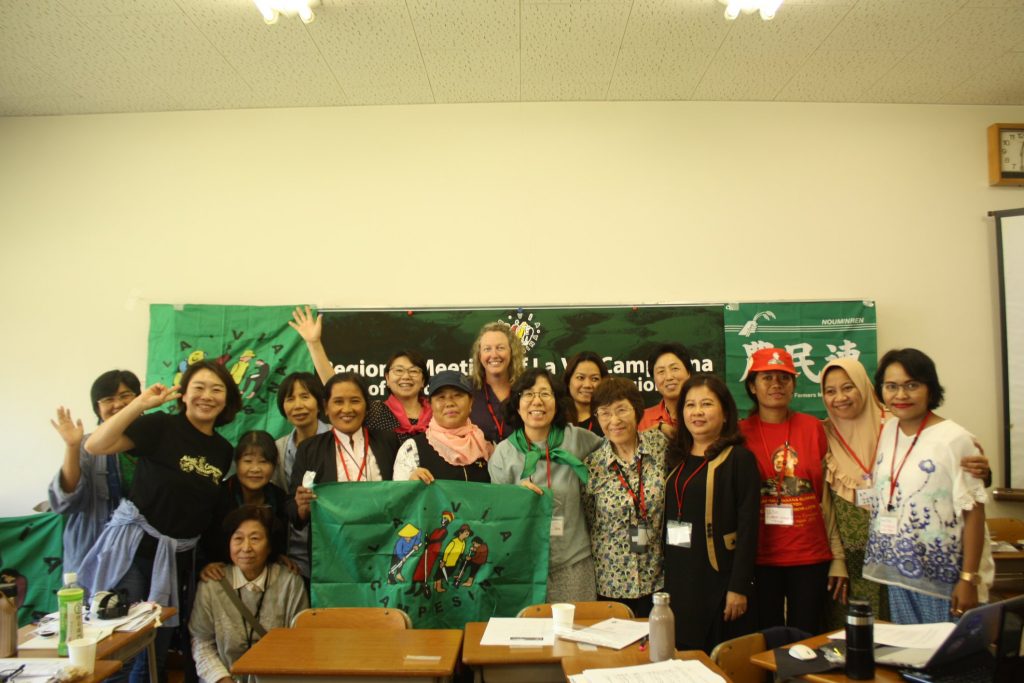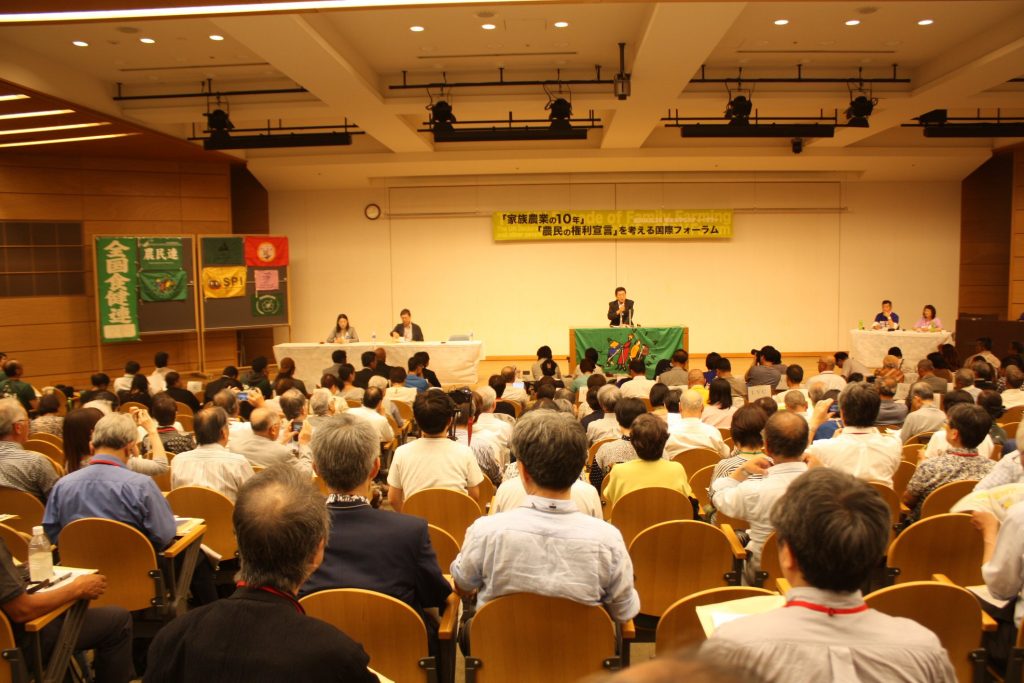South East and East Asia peasant organisations meet in Sakura, Japan

La Via Campesina South East and East Asia(LVC SEEA) held its annual regional meeting in Sakura City, Chiba Prefecture and Tokyo hosted by its member organization Nouminren(Japan Family Farmers Movement).
Ten peasant organizations who are members of La Via Campesina and one observer organization shared their struggles and activities to achieve food sovereignty during the six day long meeting in Sakura.

On May 21, the participants visited Sosa city and Sanmu city to learn about the reality and practice of peasants and family farmers in Japan. In Sosa City, people visited the site of “Sosa Solar Sharing Project” where farmers took abandoned land to produce energy and to practice organic farming. The benefits coming from energy generation is shared to producers and community to revitalize rural areas.
Following the activity, the delegates visited “Agri Sakae” producer cooperative whose members are trying to build the economy of cooperation while aiming for local production for local consumption. In Sanmu City, the participants visited Sanbu Yasai Network where experienced organic producers support young and new farmers with training.
On May 22 in the morning, Regional Women Assembly took place. It also included a special study session on Popular Peasant Feminism given by Ms.Geum Soon Yoon, former ICC member of LVC and devoted peasant woman leader. The session was set to implement the action plan of LVC SEEA Women Articulation, which is to study the issue of peasant feminism with both female and male members.

The main regional meeting was launched on May 22 in the afternoon with the beautiful Mystica prepared by Nouminren members who showed the story Japanese farmers victimized by the accident in Fukushima in 2011 and struggling to regain their right to do farming. Following the opening, LVC members shared each organization’s activities and LVC activities since the last annual meeting 2018, and study about the international political context.
The meeting also included two workshops – 1) how to strengthen communication in the regional level, and 2) how to implement UNDROP(Declaration on the Rights of Peasants and Other People Working in Rural Areas) in the regional and organizational level. On 24th in the morning, the official meeting was closed after building a regional action plan for the coming year.
On May 24 in the evening, the participants had exchange with the leadership of the host organization Nouminren at their office in Tokyo, which gave a great opportunity for LVC to learn about the history of Japanese peasants’ movement. They also visited Nouminren’s Food Research Center where they analyze the level of chemical residue and radiation of (both imported and nationally-grown) food to guarantee safety. Ms. Sumito Hatta, director of the center said, though it is expensive to run the facility, its scientific base gives very strong and influential power to strengthen the peasant movement by raising the issue of food safety to the citizens.

On May 25, International forum on the UN Declaration on Rights of Peasants and Other People Working in Rural Areas (UNDROP) and Decade of Family Farming took place at Meiji University, located in Tokyo.
Mr. Herny Simarmata, Indonesian researcher who has given big support to LVC with the issue of UNDROP, MS. Jeongyeol Kim, the International Coordination Committee member of Via Campesina, and Ms.Kae Sekine, professor at Aichi Gakuin University made presentations during the seminar; followed by speeches and discussion given by the LVC members and Japanse participants.
On the last day, May 26, LVC members participated in a seminar on the agricultural cooperative. The member learned about the history of Japan’s agricultural cooperative and distinguished example of Kinokawa Agricultural Cooperative which was presented by Mr. Uda, president of Kinokawa Agri-Coop. The session gave a chance to initiate the discussion at the regional level on what is alternative to free trade regime and how to build our market.
